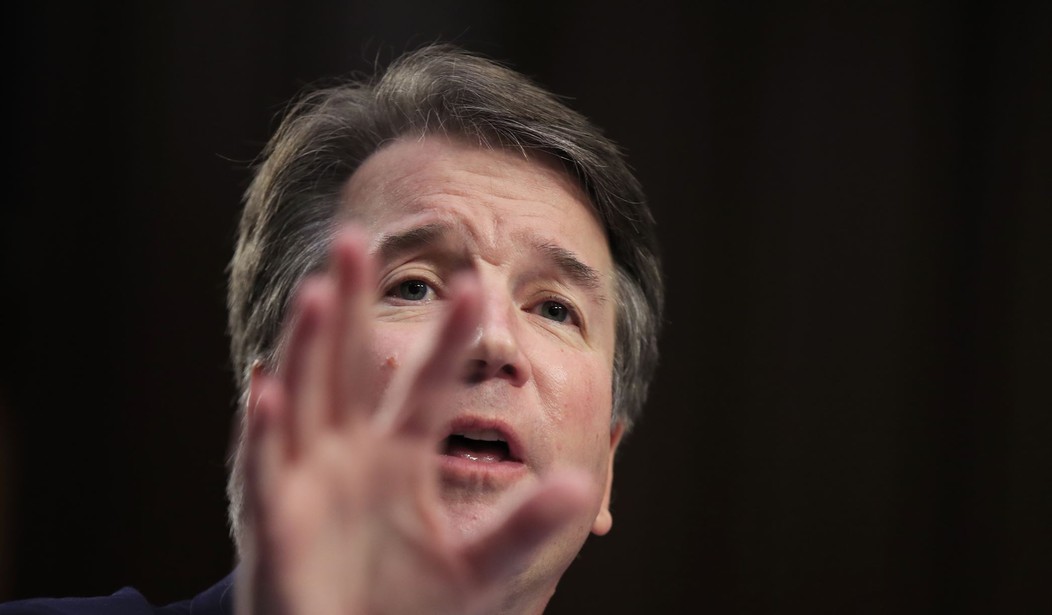What is perhaps most extraordinary about the all-out war over the Brett Kavanaugh nomination is how little the public knows about the accusations of Christine Blasey Ford, the woman who claims that at a high-school party in 1982, when she was 15, a drunken 17-year-old Kavanaugh forced her onto a bed, tried to undress her, and, when she tried to scream, covered her mouth with his hand.
The problem with Ford's allegation is that she has produced no contemporaneous evidence to support it. The Washington Post, which interviewed Ford, reported that she "told no one of the incident in any detail until 2012, when she was in couples therapy with her husband." That was 30 years after the alleged event. (Whether the phrase "in detail" has any significance is impossible to know – did she tell someone in a vague manner? – since the Post article is the only public information about Ford's account.)
Ford reportedly named a number of people who she said attended the party. None has so far corroborated her story. Recently the Senate Judiciary Committee reached Ford classmate and friend Leland Ingham Keyser, who was said to have attended. "Ms. Keyser does not know Mr. Kavanaugh and she has no recollection of ever being at a party or gathering where he was present, with, or without, Dr. Ford," Keyser's lawyer wrote to the committee.
Kavanaugh, of course, has strongly denied Ford's accusation. "I have never done anything like what the accuser describes – to her or to anyone," he said.
Contemporaneous accounts of the matter, either from people who were at the party or people Ford might have discussed it with shortly after, would be enormously valuable in assessing her allegations. That's why Ford supporters were so excited when a former classmate of Ford's, Cristina King Miranda, wrote on social media, "The incident DID happen, many of us heard about it in school." Inundated with questions from reporters, King quickly backtracked, telling NPR, "That it happened or not, I have no idea."
Recommended
When Ford did tell her story, to the therapist in 2012, there were some discrepancies between the therapist's notes and Ford's present account. It's unclear whether those discrepancies are significant, since all the public has is the Post story.
So what do Democrats do, with so little to go on? For some, the answer is faith.
"I believe Dr. Ford," said Democratic Sen. Richard Blumenthal, a member of the Judiciary Committee.
"I believe Dr. Ford," said Democratic Sen. Mazie Hirono, also a member of the Judiciary Committee.
"We believe Dr. Ford," said Democratic Sen. Chris Coons, also a member of the Judiciary Committee.
Why do they believe? Democratic lawmakers explain that they don't think a woman would come forward in such a politically charged atmosphere and expose herself to criticism if she wasn't telling the truth. They say they're not disturbed by the 30-year gap in Ford's story because some victims of sexual assault wait years to reveal what happened to them. And they say flatly that women should be believed when they make an allegation.
But the fact remains: no contemporaneous evidence. And not much since then, either. Maybe the coming days will bring some new information, but for now, Democrats are dedicated to trying to stop the Kavanaugh nomination on the basis of a charge without verification.
Now, out of the Democrats' faith comes a new argument: It doesn't matter whether Ford's charge is true. It is credible. And that is enough, because even a credible allegation -- no word on who defines what that means – disqualifies Kavanaugh for a seat on the Supreme Court.
"The truth is, I believe her," Democratic Sen. Kirsten Gillibrand said. "She has a credible allegation against Judge Kavanaugh."
Some academic Ford supporters lent their scholarly credentials to the credible-is-enough argument. "The existence of credible allegations against Judge Kavanaugh should be disqualifying," wrote Cardozo Law School professor Kate Shaw in The New York Times. "If members of the Senate conclude that a credible accusation of sexual misconduct has been made against Judge Kavanaugh, that should be enough to disqualify him."
In The Atlantic, Brookings Institution scholar Benjamin Wittes took the argument to its illogical extreme. Because of the political sensitivity of the situation, Wittes wrote, Kavanaugh "cannot ... seek to discredit a woman who purports to have suffered a sexual assault at his hands."
"Even if (Kavanaugh) believes himself innocent, even if he is innocent," Wittes concluded, "the better part of valor is to get out now." That is, to withdraw his nomination.
So there it is: Ford's supporters believe in her because they believe in her. They think a credible allegation is enough to disqualify Kavanaugh. And even if that allegation is not, in fact, true – even if Kavanaugh is innocent – he is still disqualified. In the current battle, Kavanaugh's opposition is essentially faith-based, trying to create an environment in which there is no way he can win.
Byron York is chief political correspondent for The Washington Examiner.

























Join the conversation as a VIP Member